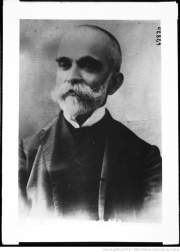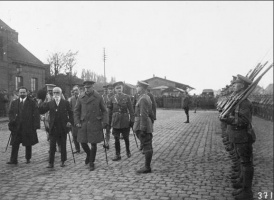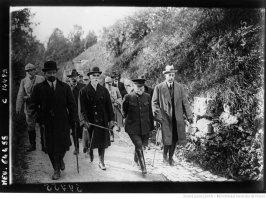Early Years, University and Politics↑
Bernardino Luís Machado Guimarães (1851–1944), son of a Portuguese father and a Brazilian mother, spent his early years in Rio de Janeiro. In 1860, he began his studies in Oporto and then at the University of Coimbra, where he became a professor of geology, physics and anthropology.
He entered politics in the Regenerator Party, serving as deputy (1882–1887), peer of the realm (1890–1895) and minister of public works, trade and industry (1893). In 1903, disappointed with the monarchic policies, he joined the Republican Party. After the proclamation of the First Republic in 1910, he became foreign affairs minister in the provisional government, deputy, ambassador in Brazil and prime minister during the July Crisis of 1914.
During the First World War↑
On 7 August 1914, Bernardino Machado received Congress’ unanimous vote to support Great Britain’s position in the scope of the Portuguese-British alliance. However, the country kept its neutrality. Bernardino Machado’s cabinet fell in December 1914. In May 1915, soon after the uprising that deposed the prime minister, Joaquim Pimenta de Castro (1846–1918), he was elected president of the Republic and was sworn into office in October 1915.
After the German declaration of war in March 1916, Machado promoted the formation of the Sacred Union Government, a republican unity between the Democrats of Afonso Costa (1871–1937), to which Bernardino Machado belonged, and the Unionists of António José de Almeida (1866–1929). In October 1917 he travelled to France on a long train journey. He was received by Alfonso XIII, King of Spain (1886–1941), French President Raymond Poincaré (1860–1934), George V, King of Great Britain (1865–1936) and Albert I, King of the Belgians (1875–1934). He visited Verdun, Reims and the rearguard of the Portuguese sector. There he experienced some hostility from soldiers and officers. In December 1917, a coup led by Sidónio Pais (1872–1918), an army major and former ambassador in Berlin, deposed Afonso Costa’s government and the president of the Republic. Both President Machado and Prime Minister Costa went into exile.
After the War↑
Sidónio Pais was murdered in December 1918 and the Democrats soon returned to power. Bernardino Machado reassumed his political activity, first as a member of the Senate (1919), then prime minister (1921) and finally as president of the Republic (1925–1926). The military movement of 28 May 1926 overthrew the First Republic regime and ended Bernardino Machado’s political career. Again exiled (1927–1940), he wrote against the military dictatorship and the New State (Estado Novo) regime. In 1940, after the German invasion of France, he returned to Portugal.
Sérgio Neto, Universidade de Coimbra
Section Editor: Ana Paula Pires
Selected Bibliography
- Afonso, Aniceto / Gomes, Carlos de Matos: Portugal e a Grande Guerra, 1914-1918 (Portugal and the Great War, 1914-1918), Matosinhos 2010: QuidNovi.
- Cunha, Norberto: Bernardino Machado e a 1.ª Grande Guerra (Bernardino Machado and the First World War), volume 1, Vila Nova de Famalicão, Portugal 2008: Câmara Municipal de Vila Nova de Famalicão/Museu Bernardino Machado.
- Marques, António Henrique R. de Oliveira / Costa, Fernando Marques da: Bernardino Machado, Lisbon 1978: Edições Montanha.
- Meneses, Filipe Ribeiro de: A Grande Guerra de Afonso Costa (Afonso Costa’s Great War), Lisbon 2015: Dom Quixote.
- Teixeira, Nuno Severiano: O poder e a guerra, 1914-1918. Objectivos nacionais e estratégias políticas na entrada de Portugal na Grande Guerra (Power and war, 1914-1918. National objectives and political strategies of Portugal’s participation in the Great War), Lisbon 1996: Editorial Estampa.










